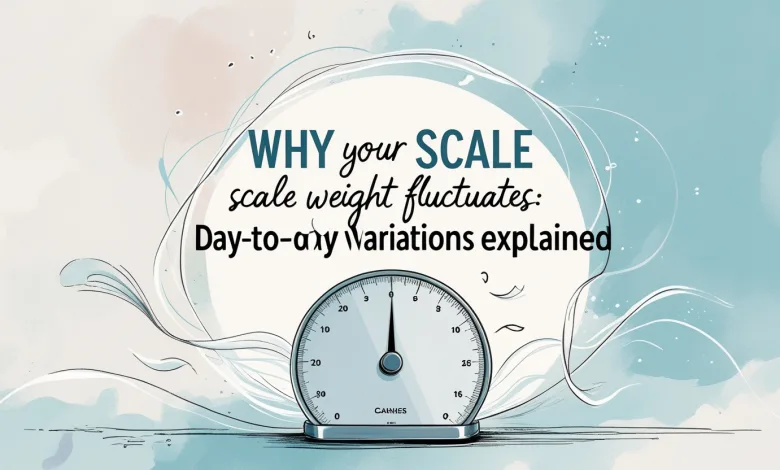Why Your Scale Weight Fluctuates: Day-to-Day Variations Explained

Ever step on the scale and wonder why the number is so different from yesterday? Those daily weight fluctuations are actually completely normal and happen for numerous physiological reasons. Let’s dive into why your weight bounces around and what it really means for your health.
The Science Behind Daily Weight Changes
You’ve probably experienced it before – you step on the scale one morning feeling great about your healthy eating choices the day before, only to find that you’re somehow up two pounds. Wait, what? How could that possibly happen? Before you throw your scale out the window (and hey, I’ve been tempted too!), let’s talk about what’s actually going on.
Your body weight isn’t just a static measurement of your fat and muscle mass. It’s a dynamic number that reflects everything currently inside your body – including food, waste, water, and more. In fact, your body weight can fluctuate by as much as 5-6 pounds in a single day, depending on various factors that have nothing to do with actual fat gain or loss.
Water Weight: The Biggest Culprit
If there’s one factor that influences day-to-day weight fluctuations more than anything else, it’s water. Did you know that water makes up about 60% of your body weight? That’s right – the majority of you is just water! And this water content can shift dramatically from day to day.
Water retention happens for numerous reasons, and can mask fat loss progress or make you think you’ve gained weight when you haven’t. Here are some common causes of water weight fluctuations:
- Sodium intake: Consumed a salty meal? Your body will hold onto extra water to maintain proper sodium concentration in your cells. Just 400mg of extra sodium (about 1/5 teaspoon of table salt) can cause your body to retain 4 cups of water – that’s two pounds on the scale!
- Carbohydrate consumption: When you eat carbs, your body stores some as glycogen in your muscles and liver. For every gram of glycogen stored, your body holds onto about 3 grams of water. A carb-heavy meal can easily add a pound or two of water weight overnight.
- Exercise: Intense workouts can cause temporary water retention as your muscles repair themselves. This inflammatory response is completely normal and necessary for building strength, but it can mask fat loss on the scale for up to 72 hours after a tough workout.
- Hormonal changes: Ladies, this one’s especially relevant for you! Hormonal fluctuations throughout your menstrual cycle can cause water retention of up to 5-10 pounds, with many women experiencing peak water weight in the days leading up to their period.
Food Weight: It’s Still In There!
This might seem obvious, but it’s worth mentioning – the food you eat has weight! And until it’s fully digested and processed by your body, that weight shows up on the scale.
A typical meal might weigh anywhere from half a pound to two pounds. If you eat three meals a day plus snacks, you could easily consume several pounds of food and beverages daily. Until that food is digested and either used for energy, stored, or eliminated as waste, it’s contributing to your scale weight.
And speaking of waste – yes, constipation can absolutely cause temporary weight gain on the scale. If you haven’t had a bowel movement in a few days, you could be carrying around an extra pound or two of waste weight. Not the most pleasant topic, I know, but it’s a real factor in scale fluctuations!
Muscle Glycogen: The Athlete’s Variable
For those who exercise regularly, glycogen levels can cause significant weight fluctuations. Glycogen is the stored form of carbohydrate in your muscles and liver, and it’s your body’s preferred quick energy source during workouts.
When you exercise intensely, you deplete these glycogen stores. Your body then works to replenish them afterward, especially if you consume carbohydrates post-workout. As mentioned earlier, each gram of glycogen holds onto about 3 grams of water. This means that as your glycogen stores fluctuate, so does your water weight.
This is why athletes often experience weight fluctuations around training days. It’s also why someone starting a low-carb diet might see a dramatic drop on the scale in the first week – they’re not losing fat that quickly, just depleting glycogen stores and shedding the associated water weight.
The Timing Factor: When You Weigh Matters
Have you ever weighed yourself in the morning and then again at night, only to find a difference of several pounds? You’re not alone! The time of day you weigh yourself can significantly impact the number you see.
Most people weigh the least first thing in the morning, after using the bathroom and before eating or drinking anything. This is because you’ve just gone 7-9 hours without food or drink, and your body has had time to process what you consumed the previous day.
By contrast, weighing yourself at the end of the day means you’re carrying all the food and drink you’ve consumed throughout the day. You’re likely also experiencing some normal fluid retention from being upright and active.
This is why health professionals recommend weighing yourself at the same time each day, preferably in the morning under similar conditions, if you’re tracking your weight over time. Consistency is key to getting meaningful data from the scale.
Other Surprising Factors That Affect Scale Weight
Beyond the major players we’ve discussed, several other factors can influence what you see on the scale:
- Air travel: Cabin pressure changes during flights can cause fluid retention, not to mention the sodium-rich airplane food and disrupted hydration. Don’t be surprised if you’re up a few pounds after a long flight!
- Weather and climate: Hot, humid weather can cause increased water retention as your body works harder to stay cool.
- Medication: Many prescription and over-the-counter medications list water retention as a side effect. Antihistamines, pain relievers, and some blood pressure medications are common culprits.
- Stress: When stressed, your body releases cortisol, which can prompt water retention. This is why stressful periods in life might coincide with unexplained weight gain on the scale.
- Alcohol consumption: That post-drinking bloat isn’t your imagination! Alcohol is dehydrating, which triggers your body to retain water. It also causes inflammation and can disrupt digestion, all of which impact scale weight temporarily.
What Your Scale Weight Actually Tells You (And What It Doesn’t)
Let’s get one thing straight – the number on your scale is just data. It’s not a judgment of your worth, your health, or even necessarily your progress toward fitness goals. Given all the factors we’ve discussed, it should be clear that daily weight fluctuations are a poor indicator of actual body composition changes.
Your scale weight doesn’t tell you:
- How much muscle you have
- How much fat you’ve gained or lost
- How healthy your cardiovascular system is
- How strong you are
- How well your metabolism is functioning
What it does tell you is the total mass of everything in and on your body at that specific moment. That’s useful information when tracked properly over time, but it’s just one data point among many that can help assess your health and progress.
How to Track Weight in a Meaningful Way
If you’re working toward weight-related health or fitness goals, here are some smarter approaches to using the scale:
- Weigh yourself at the same time, under the same conditions. First thing in the morning, after using the bathroom and before eating/drinking is generally best.
- Look for trends, not daily fluctuations. Consider using a weight tracking app that shows your weight trend line rather than focusing on day-to-day changes.
- Weigh less frequently if daily fluctuations stress you out. Once a week might give you more meaningful information without the daily emotional rollercoaster.
- Use other metrics alongside scale weight. Body measurements, how clothes fit, energy levels, and strength gains can all provide valuable context.
- Consider a smart scale that measures body composition. While not perfectly accurate, these can help you distinguish between changes in water, muscle, and fat mass over time.
“The scale is just one tool in your toolbox,” says Dr. Spencer Nadolsky, a board-certified obesity specialist. “It provides data, but that data needs context. Many of my patients find weekly averages much more useful than daily weights for tracking true progress.”
When to Be Concerned About Weight Fluctuations
While day-to-day weight changes of 1-5 pounds are completely normal, there are some patterns that might warrant medical attention:
- Gaining or losing more than 5 pounds in a single day without explanation
- Consistent weight gain of more than 2 pounds per week for several weeks (when not actively trying to gain weight)
- Sudden weight changes accompanied by symptoms like extreme thirst, fatigue, or swelling
- Unexplained weight loss when not trying to lose weight
These situations could indicate underlying health issues like thyroid problems, heart or kidney dysfunction, or metabolic disorders. When in doubt, check with your healthcare provider.
FAQs About Weight Fluctuations
Q: Can I gain 3 pounds of fat in one day? A: No, that’s physiologically impossible. To gain one pound of fat, you need to consume approximately 3,500 calories beyond what your body needs. Gaining 3 pounds of fat would require an excess of 10,500 calories – that’s about 35 large order of fast food fries in one day! What you’re seeing is almost certainly water weight, food weight, or other temporary factors.
Q: Why do I weigh more after a workout? A: This is usually due to slight dehydration (which concentrates your blood, making it seem like you’ve lost water weight) or microscopic muscle tears causing inflammation and water retention as part of the repair process. It’s completely normal and no reason to skip your workout!
Q: How long does water weight from sodium last? A: Typically, water retention from a high-sodium meal lasts about 1-2 days as your kidneys work to restore balance. Staying hydrated actually helps your body flush excess sodium more quickly.
Q: Do certain foods cause more water retention than others? A: Yes! Beyond salty foods, highly processed carbohydrates, alcohol, and foods that you’re personally sensitive to can all cause increased water retention and bloating.
The Final Weigh-In: What Really Matters
When all is said and done, those daily fluctuations on the scale don’t define your health journey. Your body is an incredible, complex system that’s constantly adjusting and balancing numerous processes – and those adjustments show up on the scale.
If you’re working toward health or fitness goals, remember that true changes in body composition happen gradually over weeks and months, not overnight. A more helpful approach might be to focus on building sustainable health habits like regular exercise, nutritious eating, stress management, and quality sleep.
“Weight is just one measure of health, and not even the most important one,” explains Dr. Jennifer Gaudiani, internal medicine physician specializing in eating disorders. “Blood pressure, cholesterol levels, strength, endurance, mental wellbeing – these are all equally or more important indicators of health than the number on your scale.”
So the next time your scale throws you a curveball, take a deep breath and remember – it’s just data, not destiny. Your body is doing exactly what it’s supposed to do, fluctuations and all.





